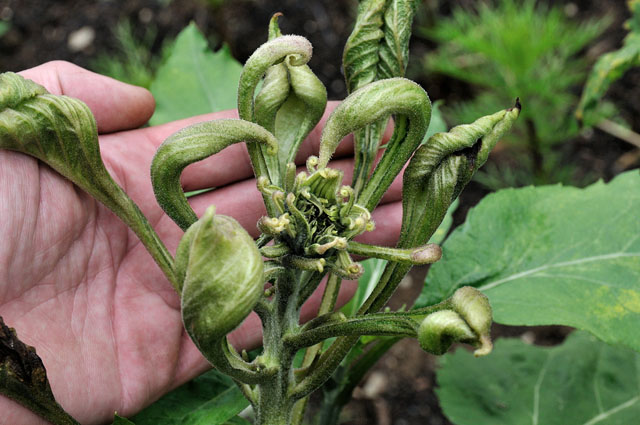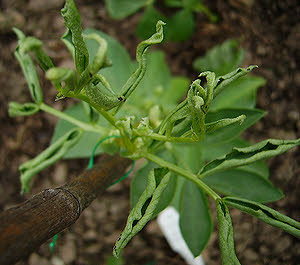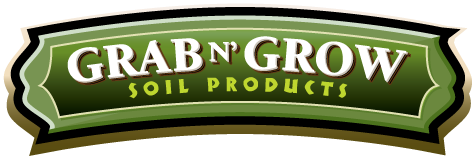Most of us don’t have to be convinced of the importance of compost in the garden. The list of benefits could fill a book. Compost does wonders for both building your soil long-term and for boosting your plants in the season you apply it. The first benefit of compost that comes to mind is organic matter and its importance to the health of your soil. We’ve also talked before on the blog about some different ways to make compost at home.
Today, I want to bring your attention to one potential risk of using compost that you don’t know too much about. Get ready to learn about some nasty chemicals which, if present in your compost, can seriously damage your garden plants.
Meet the Contaminants
Two herbicides you should know about are Clopyralid and Aminopyralid. They are widely used to kill broadleaf weeds growing in grain fields, hay fields, and along roadways. These man-made chemicals are easily absorbed by plants and remain chemically intact in live and dead plants.
If a horse, cow, or any other livestock eats hay or grain from a producer who has used these herbicides to control weeds, the chemicals enter the animal’s digestive tract, but do not break down. The toxic substances pass through the animal into manure, urine, and bedding, contaminating any organic material they come in contact with, e.g. soil and compost.
So, unknowingly, you could bring home – or make – compost with contaminated material. And then you’re likely to wreak havoc on your garden.

It only takes the tiniest amount of Clopyralid or Aminopyralid to harm your plants. As little as 1-3 parts per billion (not million, but billion) will negatively affect the growth of plants in the nightshade category. Some of the most susceptible plants are tomatoes, eggplant, potatoes, and peppers, many legumes including clover, beans, and peas. Lettuce, sunflowers, and carrots and their relatives are also at risk. So a lot of our garden favorites!
How To Tell If Your Plants Are Contaminated
If you’ve done all you can for your garden and you’re still not seeing great results, it’s worth looking into your compost and making sure it was made with clean ingredients.

While contamination can be hard to identify, you may see symptoms such as sudden death, low yields, poor seed germination, and distorted looking leaves.
How To Ensure That Your Compost is Clean
The best thing you can do is to start asking questions. If you make compost at home and get manure from your local ranch, ask the rancher about their hay practices and what, if anything, they use to keep down the weed population on their land. It’s worth familiarizing yourself with some of the brand names these ingredients are sold under. Aminopyralid is an active ingredient in Milestone, Forefront, Pharaoh, Banish, and Clopyralid is sold as Curtail, Confront, Clopyr AG, Lontrel, Stinger, Millennium Ultra, Millenium Ultra Plus, Reclaim, Redeem, and Transline.
If you’re buying pre-made compost for your garden, you can inquire as to whether the producer tests for these substances. Commercial compost suppliers should take pride in their product and put it through a rigorous testing process to ensure manures are free of Clopyralid and Aminopyralid even BEFORE they are transported to their composting facility.
My Garden Is Contaminated – What Do I Do?
If you do find that these chemicals have made their way in your garden, you have to wait it out a couple of seasons. Eventually the herbicides will disappear. In the meantime you can grow some cover crops from the grass family, as they won’t be negatively affected.
So, be careful! Ask a lot of questions! But please don’t stop using compost. Your soil and garden deserve it.
———
For more info:
http://www.dowagro.com/en-us/range/forage-management/aminopyralid-stewardship







 Family
Family

